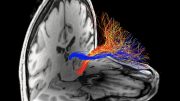
Attractive food smells are enough to blunt the life-extending effect of a restricted diet. A research team figured out why this is the case and whether the phenomenon could be blocked with a drug.
The smell of food blocks the life-extending effect of a restricted diet. These drugs may unblock it.
A research study using worms provides new clues about the role of serotonin and dopamine in aging.
It’s common knowledge that a healthy diet is essential to a healthy life. And while many people follow specialized diets to trim down or improve their overall health, scientists interested in aging have been actively studying the life-extending effects of dietary restriction and fasting.
“There’s a concept called hormesis in biology, the idea of which is what doesn’t kill you makes you stronger,” said Scott Leiser, Ph.D., an assistant professor in Molecular & Integrative Physiology, and Internal Medicine at University of Michigan Medical School.
“One of the stresses that’s been most studied is dietary restriction, shown in many different organisms to extend lifespan and in people to improve health.”
Related
However, as anyone on a strict weight loss regimen can attest, the mere smell of delicious food can be enough to break one’s willpower. What’s more, previous research actually found that in fruit flies, attractive food smells are enough to blunt the life-extending effect of a restricted diet. That study was from Leiser’s colleague Scott Pletcher, Ph.D., also of the Department of Molecular & Integrative Physiology.
In a new study published on June 7, 2022, in Nature Communications, Leiser, first authors Hillary Miller, Ph.D., and Shijiao Huang, Ph.D., and their team build on that research to figure out why this is the case and whether a drug could block the phenomenon.
In the roundworm C. elegans, lifespan extension in response to environmental stressors such as dietary restriction involves the activation of the fmo-2 gene. The researchers used the transparent nature of C. elegans to be able to see, in real time, the levels of FMO proteins.
When worms were limited in the amount of food they could eat, the FMO protein, which was highlighted using a fluorescent marker, lit up “like a Christmas tree…it was bright red,” noted Leiser. However, when the worms were exposed to food smells, there was considerably less activation of FMO, leading to a loss of life extension.
One of the main issues of dietary restriction as a potential approach for life extension in people is how difficult it is. But, said Leiser, “what if you could give yourself a drug that confused your body into thinking you were restricting your diet?”
Building on earlier research showing that neurotransmitters regulate longevity resulting from dietary restriction, the team screened compounds known to act on neurons.
They found three compounds that could prevent the reversal of fmo-2 induction in the presence of food: an antidepressant that blocks the neurotransmitter serotonin, and two antipsychotic drugs used to treat schizophrenia, both of which block the neurotransmitter dopamine.
“We know serotonin and dopamine are major players in the reward portion of the brain and tend to be involved in satiety and food response signals,” said Leiser. “The fact that the drugs we found were antagonizing this suggests you are blocking aspects of these pathways.” Ultimately, the drugs enabled the life extension effect of FMO, even in the presence of the smell of food.
These specific drugs are unlikely to be prescribed for this effect however, given their many potentially dangerous side effects. But they provide important clues about the fmo-2 activation pathway and its effect on life extension.
Reference: “Serotonin and dopamine modulate aging in response to food odor and availability” by Hillary A. Miller, Shijiao Huang, Elizabeth S. Dean, Megan L. Schaller, Angela M. Tuckowski, Allyson S. Munneke, Safa Beydoun, Scott D. Pletcher and Scott F. Leiser, 7 June 2022, Nature Communications.
DOI: 10.1038/s41467-022-30869-5









So, you must not only be hungry to live more time. You must also be unhappy and depressed. Nice!
I would rather live (moderately) well and enjoy it than (stressfully) healthy and worry about it. The healthy long living folks die of something too.
I wonder if those with a reduced sense of smell could be getting some benefit from this effect, somewhat offsetting the reduced life expectancy from the mini-strokes assumed to cause smell loss? Perhaps Covid could be life extending?
What drugs? Are these being prescribed to kids and teens?
If something is enticing my senses I know it’s due to a chemical reaction in the brain that genetically remembers that scent as feel good or (dopamine). Therefore it’s immediate triggers are to me one in the same as any other dopamatically addictive chemical substance. Pharmacological or natural in nature. Or as anyone would recognize as intentional or unintentional substances. They all create the same chemical reaction in the brain. That’s why if you hold a pencil in your mouth your body believes it is happy even in the worst situations. You cause to become what you will when you have the will to do so.
I am a firm advocate for sensory being temporary. Or as one would call a “quick fix ” whether that be of an Instant gratification of the senses or any other central nervous stimulant. It’s not the actual substance (matter)It’s whether the substance matters to the genetic coding component of each as genetic memory that makes it enticing to the senses. If not it feels complete depravation. Depravation reads in biology aswell. Except it’s social construct intimidates what’s relative to it’s time and it’s environment whether it was forced to go without in the past or presently. Just trust the body but not the senses short and sweet.